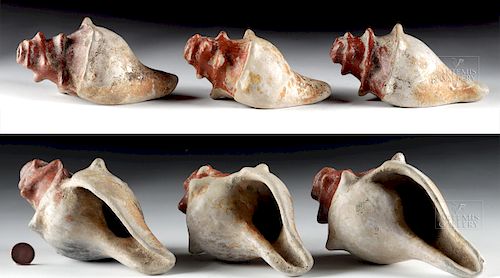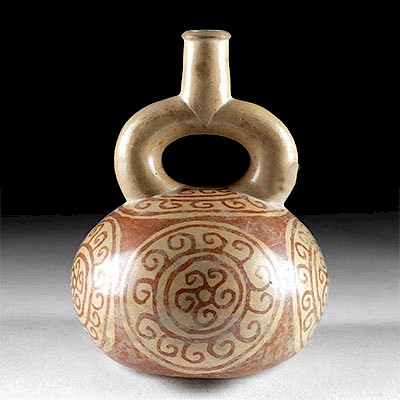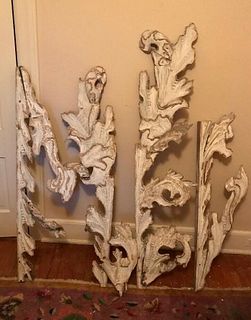Colima Pottery Conch Shell Trumpets, 3 pcs
Lot 19
About Seller
Artemis Fine Arts
686 S Taylor Ave, Ste 106
Louisville, CO 80027
United States
Selling antiquities, ancient and ethnographic art online since 1993, Artemis Gallery specializes in Classical Antiquities (Egyptian, Greek, Roman, Near Eastern), Asian, Pre-Columbian, African / Tribal / Oceanographic art. Our extensive inventory includes pottery, stone, metal, wood, glass and textil...Read more
Estimate:
$2,500 - $3,500
Absentee vs Live bid
Two ways to bid:
- Leave a max absentee bid and the platform will bid on your behalf up to your maximum bid during the live auction.
- Bid live during the auction and your bids will be submitted real-time to the auctioneer.
Bid Increments
| Price | Bid Increment |
|---|---|
| $0 | $25 |
| $300 | $50 |
| $1,000 | $100 |
| $2,000 | $250 |
| $5,000 | $500 |
| $10,000 | $1,000 |
| $20,000 | $2,500 |
| $50,000 | $5,000 |
| $100,000 | $10,000 |
| $200,000 | $20,000 |
About Auction
By Artemis Fine Arts
Jan 24, 2019
Set Reminder
2019-01-24 10:00:00
2019-01-24 10:00:00
America/New_York
Bidsquare
Bidsquare : Pre-Columbian / Ethnographic Art
https://www.bidsquare.com/auctions/artemis-gallery/pre-columbian-ethnographic-art-3814
Featuring ancient and ethnographic art from around the world, including Pre-Columbian, Native American, African / Tribal, Ethnographic, Spanish Colonial, Fossils, Fine Art, much more. Artemis Fine Arts info@artemisgallery.com
Featuring ancient and ethnographic art from around the world, including Pre-Columbian, Native American, African / Tribal, Ethnographic, Spanish Colonial, Fossils, Fine Art, much more. Artemis Fine Arts info@artemisgallery.com
- Lot Description
Pre-Columbian, West Mexico, Colima, ca. 300 BCE to 300 CE. A trio of highly realistic, nearly identical ceramic shells, each with openings to allow them to be used as trumpets. Each is in the form of a conch, with an elongated canal and four concentric spires leading to another round opening. Remains of dark red and white pigment are on the surfaces of each. Shell trumpets were used by the Colima to mark special ceremonies and community events, and also seem to have been signs of wealth and happiness. Size of one (they are all similar in size): 6.2" W x 2.6" H (15.7 cm x 6.6 cm)
Colima, located on Mexico's southwestern coast, was during this time part of the shaft tomb culture, along with neighbors to the north in Jalisco and Nayarit. In this culture, the dead were buried down shafts - 3 to 20 meters deep - that were dug vertically or near vertically through the volcanic tuff that makes up the geology of the region. The base of the shaft would open into one or more horizontal chambers with a low ceiling. These shafts were almost always dug beneath a dwelling, probably a family home, and seem to have been used as family mausoleums, housing the remains of many related individuals. Conch shells are often found in shaft tomb burials in the area of the deceased's pelvis.
Provenance: ex-private Santa Fe, New Mexico, USA collection
All items legal to buy/sell under U.S. Statute covering cultural patrimony Code 2600, CHAPTER 14, and are guaranteed to be as described or your money back.
A Certificate of Authenticity will accompany all winning bids.
We ship worldwide and handle all shipping in-house for your convenience.
#142920All are intact, with nice remaining pigment and deposits on all surfaces.Condition
- Shipping Info
-
All shipping is handled in-house for your convenience. Your invoice from Artemis Gallery will include shipping calculation instructions. If in doubt, please inquire BEFORE bidding for estimated shipping costs for individual items.
-
- Buyer's Premium



 EUR
EUR CAD
CAD AUD
AUD GBP
GBP MXN
MXN HKD
HKD CNY
CNY MYR
MYR SEK
SEK SGD
SGD CHF
CHF THB
THB














